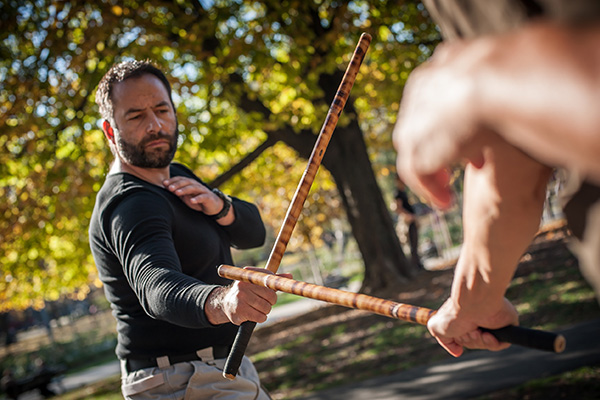stress
Tarot Forecast August 2024: Seven Of Wands
 The card for this month is the Seven of Wands, which predicts the need for determination, resilience and facing challenges head-on.
The card for this month is the Seven of Wands, which predicts the need for determination, resilience and facing challenges head-on.
The Seven of Wands depicts a figure standing on higher ground, holding off opponents below with a single wand. The imagery conveys a sense of defiance and unwavering determination, suggesting that despite the challenges and competition, victory is possible through perseverance and courage.
As we enter this month with the Seven of Wands as our guiding influence, we are reminded of the importance of staying true to our values and beliefs, even in the face of significant obstacles. The Seven of Wands encourages us to adopt a warrior-like spirit, ready to defend our positions and protect what we hold dear.
This card signals a time when we must be prepared to encounter resistance and opposition, whether in our personal, professional or spiritual pursuits. It serves as a reminder that while challenges are inevitable, our strength lies in our ability to remain steadfast and resilient. The Seven of Wands teaches us that through determination and unwavering focus we can overcome adversity and emerge victorious.
We are likely to find ourselves in situations this month where we need to defend our position or beliefs, but remember that your courage and inner strength will see you through. Our resilience and positive attitude will inspire those around us, creating an atmosphere of motivation and progress.
The Mystical Healing Power Of Flowers
 If you were to walk into my garden in England, one of the first things you might notice is a beautiful hanging basket full of purple petunias. I put it there for a number of reasons, and not just to admire its beauty. No, it is where it is because of how it makes me feel.
If you were to walk into my garden in England, one of the first things you might notice is a beautiful hanging basket full of purple petunias. I put it there for a number of reasons, and not just to admire its beauty. No, it is where it is because of how it makes me feel.
The energy of flowers is metaphysically powerful and can help you achieve emotional and spiritual well-being. My purple petunias make me feel motivated and full of well-being.
Okay, this may seem like a bold statement, but flowers are truly magical in that they can help increase your productivity and overall happiness, soothe any sensitivities in your life, and motivate you at the same time. And yes, they can do this for you just by looking at them.
So, how do flowers work their magic on us? Mother Nature puts a lot of time and effort into creating beautiful flowers. In fact, a single flower can take weeks or even months to fully develop, making it the part of the plant with the highest energy vibration. When you work with such masterpieces of nature, you are indeed working with the most powerful and purest of energies.
Each flower carries its unique vibrational frequency, which interacts with our own energy fields. This interaction can lead to subtle yet profound changes in our mental, emotional and spiritual state. For example, the vibrant purple hue of petunias resonates with the crown chakra, enhancing our connection to higher consciousness and promoting a sense of peace and clarity. Similarly, the delicate structure and soothing colors of flowers like lavender can harmonize our energy, reducing stress and fostering relaxation.
Is Your Texting Pushing Him Away?
 A new client recently contacted me about a promising romantic relationship. The first thing that became clear as I began to read for her was that she had a long history of dating men who seemed like potential long-term partners, but then suddenly disappeared or broke up with her after only a few months.
A new client recently contacted me about a promising romantic relationship. The first thing that became clear as I began to read for her was that she had a long history of dating men who seemed like potential long-term partners, but then suddenly disappeared or broke up with her after only a few months.
It quickly also became clear to me that texting was a significant factor in her dating problems. Misunderstandings due to texting have damaged the romantic, family, and friendship relationships of many people I have worked with as a psychic professional. This client was no exception.
As I read the energy around her situation, I sensed that she had a tendency to push men away by unnecessarily panicking when she did not feel completely in control. Guys can sense panic and controlling tendencies and for most men this is usually a big turnoff.
This kind of negative energy is also stressful and doesn’t improve the outcome of an uncertain situation. Excessive obsession, panic, and worry will not bring someone closer to you; in fact, it can push a potential long-term relationship away forever.
I then had to tell her that while I did see the potential for a long-term relationship in their connection, I didn’t currently see a long-term future for them if she continued with all the texting she was doing. I told her to take a step back, breathe, stop worrying so much, and definitely not try to resolve things through texting any more.
Empower Your Day With A 5-Minute Morning Routine
 Navigating modern life can be daunting these days, especially when juggling a business or career, family responsibilities, social commitments and personal and spiritual self-care (if there is any time left for such a ‘luxury’).
Navigating modern life can be daunting these days, especially when juggling a business or career, family responsibilities, social commitments and personal and spiritual self-care (if there is any time left for such a ‘luxury’).
Some days can feel like an endless climb, a never-ending hamster wheel. But I have learned that even the smallest adjustments in your lifestyle can invoke the most profound changes.
A spiritual self-care strategy that has worked wonders for me is my simple five-minute morning routine. It has transformed not only my personal life but also my psychic practice in ways I never imagined.
As a passionate artist and psychic professional, I often found myself feeling a little overwhelmed and scattered. Many of my mornings used to be chaotic and my energy was often all over the place, typically setting a stressful tone for the rest of my day.
I was desperate for a change. I needed a way to stay centered, focused and productive without adding more time demands and complexity to my already busy schedule.
Then it hit me: why not try a quick morning routine designed to centre and ground me, cleanse and shield my energy, and set positive intentions for the day ahead?
The morning is a particularly powerful time to practice such a routine, I thought. How we start our day obviously sets the tone for the hours that follow. A positive, focused start, empowered by a mindful soul connection to Spirit and the Divine, can only set the stage for an empowering and fulfilling day, while a chaotic, disconnected start only leads to stress, inefficiency and negativity. So, I decided to give it a go and have not looked back since.
The Soulful Practice Of Kirtan Chanting
 An ancient spiritual practice less known in the West has transformed my spiritual routine in recent years. It is known as kirtan a beautiful form of devotional chanting that originated in ancient India.
An ancient spiritual practice less known in the West has transformed my spiritual routine in recent years. It is known as kirtan a beautiful form of devotional chanting that originated in ancient India.
The term “kirtan” comes from Sanskrit and means “narrating, reciting, telling, describing” of an idea or story, particularly in a religious context. This enchanting practice weaves together music, meditation, chanting, and a deep sense of spiritual expression.
Kirtan is a central practice in the Bhakti Yoga tradition, which emphasizes love and devotion to a personal deity. It involves the repetitive chanting of mantras and divine names, traditionally in Sanskrit, accompanied by musical instruments such as the harmonium, tabla, and cymbals.
Traditionally, kirtans focus on chanting the names of deities like Krishna, Rama, or Sita. The kirtan leader sings a line and the congregation responds, creating a rhythmic and melodic interplay that is both meditative and invigorating.
While Kirtan remains rooted in its spiritual origins, it has gained global popularity beyond India and the Bhakti tradition. As the practice of yoga has boomed worldwide, kirtan too has seen an immense rise in popularity. It’s a testament to the universal appeal and transformative power of this captivating practice.
Kirtan events and gatherings are known for being welcoming and inclusive, focusing on the shared experience of chanting rather than strict religious adherence. Unlike the typical musical experience in spiritual settings, kirtan invites everyone to participate in a soulful, call-and-response chanting that creates a profound connection to the divine and brings people closer together.
Tarot Forecast July 2024: The Tower
 This month’s card is the Tower, which predicts the energies of disruption, revelation, transformation and the breaking down of old structures.
This month’s card is the Tower, which predicts the energies of disruption, revelation, transformation and the breaking down of old structures.
The Tower card is a powerful symbol of sudden upheaval and change. It’s traditionally depicted as a tall tower struck by lightning, representing chaos and upheaval. It represents life throwing us a curveball.
As lightning strikes and flames dismantle the old structure, it forces us to confront our foundations and belief systems. While painful, this destruction can lead to necessary revelations and a chance to rebuild on a stronger foundation. By letting go of what no longer serves you, you open yourself up to new possibilities.
The Tower showing up in a reading, though scary and troubling at first glance, always precedes a period of significant growth. Destruction creates opportunity. Most situations we face are opportunities, even the bad ones. It’s all about the opportunity and how you see it.
Embracing chaos will be the key to clarity and growth this month. This is a time to rebuild and redesign your life in a way that is more in line with your true self.
Approach the month with an open heart and a willingness to let go of what no longer serves you. Whether it’s health, finances, career, relationships or personal growth, the Tower’s influence will lead you to a more liberated and empowered version of yourself. Trust the transformative power of the Tower. Embrace the changes and you will emerge from this month stronger, wiser and more in alignment with your true self.
Finding Your Strength And Peace In Difficult Times
 I’ve noticed many of my clients feeling as though the world is crumbling around them lately, unsure of how to navigate the chaos that surrounds them.
I’ve noticed many of my clients feeling as though the world is crumbling around them lately, unsure of how to navigate the chaos that surrounds them.
If this is true for you, then it is essential to remind yourself that the actions and choices of others do not define your path – it’s theirs to walk, not yours. Your focus should remain on your journey and how you can positively impact the world around you. Spirit has been very clear in its guidance in this regard.
Everyone has something in their soul that they need to release, move past and grow from or it will just karmically repeat itself in every lifetime. Let go of trying to fix other people or solve their problems and just move forward with your own life. Do not give your power away to anyone, for Source is with you and always wants you to keep your power.
If you find yourself constantly watching the news, engaging with negative content on social media, or dealing with recent grief from the loss of loved ones to suicide, terminal illness, or strained relationships, it’s time to take a step back and ground yourself.
Grief, stress, and anxiety can take a toll on your mental, emotional, and spiritual well-being. During these times, reconnecting with your spirituality and grounding yourself can provide comfort, strength, and a sense of peace. It is important that you do not let go of your inner power or allow the outside world to suck the life out of you.